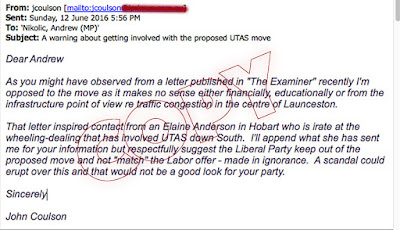Thank you to those who signed the original petition requesting that Launceston City Council convene a Public Meeting to discuss the gifting of the land at Inveresk (the old Velodrome cycling track site next to York Park Stadium) and the Willis Street public car park site (the old Goods Railyard on the opposite side of the North Esk River) and who were able to attend the Public Meeting that was finally concluded last week on 21st June at Albert Hall.
The 132 members of the public attending the Public Meeting overwhelmingly opposed the gifting of the land to the University, compared to less than 10 of those who were willing to vote AGAINST the Motions put to the meeting.
Since the Meeting, The Examiner Newspaper (who has admitted publicly its bias in supporting the move by UTas to Inveresk) received 138 Facebook comments, all opposing the proposal. That level of comment to a media Facebook story is extraordinary!
Unfortunately, Launceston City Council is not obliged to accept the outcome of the Public Meeting, and we are sure that LCC will continue to progress the gifting of the 2 pieces of land to UTas.
However, the Local Government Act 1993 allows for petitioners to proceed to sign a SECOND PETITION, once a Public Meeting has been held on the topic, this time requesting LCC to facilitate an ELECTOR POLL of all Launceston people on the Launceston Elector Roll.
A minimum of 1000 elector signatures (we aim for say, 1500 so as to ensure its validity) must be collected and presented by 20 July 2016.
We expect this will be a major undertaking in such a short time, however, with your assistance, we hope we can succeed.
If you are able to print off the Petition Form, then we ask that you:
- email LauncestonPR@bigpond.com asking for the PDF Form;
- sign the form and encourage as many friends and acquaintances on the Launceston Roll, to do likewise.
- post original copies ack to our collection point (P.O. Box 513 Launceston 7250); OR
- simply drop them into my letterbox at 41 High Street, when you are passing.
- You may also like to send a copy of the Petition to your friends, by email.
In the meantime, here are a few ‘dot’ points to summarise last Tuesday night’s Public Meeting:
- Criticism of Council’s lack of due diligence, including construction problems/costs and issues with developing on the flood plains of the North Esk River and potential seismic risks
- The track record of UTas in consistently chipping away at the Launceston campus making it but a shadow of what it was 20 years ago. There is no confidence this pattern will change
- 10,000 PLUS extra students can’t be guaranteed. It is an aspirational figure based on demographics not fact, and a fraud to say that is the kind of figure that will eventuate from this proposal
- Absence of support by electors
- Risk of UTas plan not fully eventuating or finding success – the punt
- Reliance on trust versus a properly defined and proven business plan
- The Northern Campuses remaining lesser branches of UTas without the ability of independent initiatives to remain sustainable
- Traffic congestion and parking inadequacies for UTas and other users of the precinct
- We need a uniquely Northern campus independent of UTas
If you are concerned about the high level of LCC Rates that you are being required to pay, and at how LCC spends your hard-earned money, then please sign the Petition. Council’s valuation of these two pieces of land is $4.5M and apart from the loss of this significant sum that would lessen the Launceston rate burden, the land currently produces a healthy income to Council that helps offset rates paid by its citizens. Once this becomes University owned, not even rates are payable.
Many thanks,
Regards,
Lionel Morrell
President
Tasmanian Ratepayers Association Inc.
41 High Street
Launceston TAS 7250
T 03 6331 6144
e li82303@bigpond.net.au















